小学英语一般现在时和现在进行时训练与阅读15篇
一般现在时和现在进行时练习题含答案
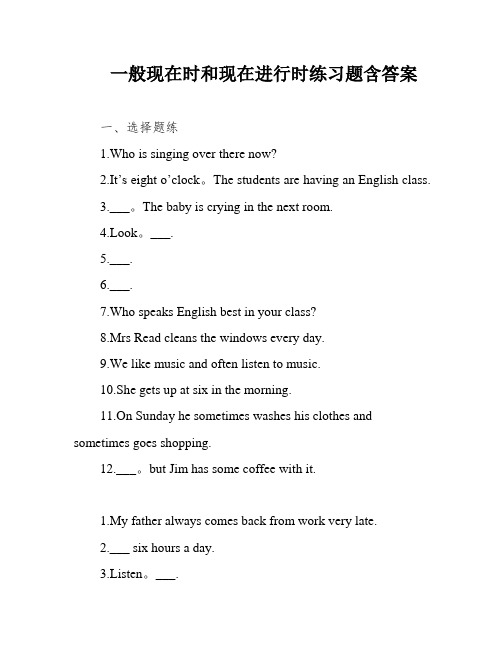
一般现在时和现在进行时练习题含答案一、选择题练1.Who is singing over there now?2.It’s eight o’clock。
The students are having an English class.3.___。
The baby is crying in the next room.4.Look。
___.5.___.6.___.7.Who speaks English best in your class?8.Mrs Read cleans the windows every day.9.We like music and often listen to music.10.She gets up at six in the morning.11.On Sunday he sometimes washes his clothes and sometimes goes shopping.12.___。
but Jim has some coffee with it.1.My father always comes back from work very late.2.___ six hours a day.3.Listen。
___.___?5.Where do you have lunch every day?6.___。
___ ___.Present participle forms:1.working。
singing。
playing。
studying2.dancing。
having。
writing。
taking3.running。
sitting。
shopping。
swimmingThird person singular forms:1.works。
reads。
cleans。
writes2.___。
washes。
guesses。
watches3.goes。
does。
(完整word)一般现在时和现在进行时练习题(含),文档
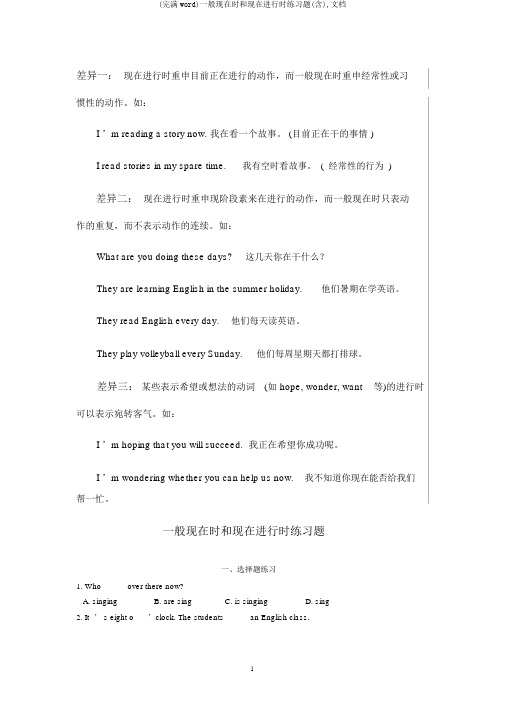
差异一:现在进行时重申目前正在进行的动作,而一般现在时重申经常性或习惯性的动作。
如:I ’m reading a story now. 我在看一个故事。
(目前正在干的事情 )I read stories in my spare time.我有空时看故事。
(经常性的行为)差异二:现在进行时重申现阶段素来在进行的动作,而一般现在时只表动作的重复,而不表示动作的连续。
如:What are you doing these days?这几天你在干什么?They are learning English in the summer holiday.他们暑期在学英语。
They read English every day.他们每天读英语。
They play volleyball every Sunday.他们每周星期天都打排球。
差异三:某些表示希望或想法的动词(如 hope, wonder, want等)的进行时可以表示宛转客气。
如:I ’m hoping that you will succeed. 我正在希望你成功呢。
I ’m wondering whether you can help us now.我不知道你现在能否给我们帮一忙。
一般现在时和现在进行时练习题一、选择题练习1.Who _____ over there now?A. singingB. are singC. is singingD. sing2.It ’ s eight o’clock. The students _____ an English class.A. haveB. havingC. is havingD. are having3. Listen! The baby _____ in the next room.A. cryingB. criedC. is cryingD. cries4. Look! The twins _____ new sweaters.A. are wearingB. wearingC. are wearD. is wearing5. Don ’ t talk here. Grandparents _____.A. is sleepingB. are sleepingC. sleepingD. sleep6. Tom is a worker. He _____ in a factory. His sisters _____ in a hospital.A. work/ workB. works/ workC. work/ works7. Who _____ English best in your class?A. speakB. speaksC. speaking8. Mrs Read _____ the windows every day.A. is cleaningB. cleanC. cleans9. We _____ music and often _____ to music.A. like/ listenB. likes/ listensC. like/ are listening10. She _____ up at six in the morning.A. getB. getsC. getting11. On Sunday he sometimes _____ his clothes and sometimes _____ some shopping.A. wash/ doB. is washing/ is doingC. washes/ does12. The twins usually _____ milk and bread for breakfast,but Jim _____ some coffee for it.A. have/ haveB. have/ hasC. has/ have13. Father usually ______ his newspaper after dinner.A. readB. readsC. ReadingD. is reading14. The Blacks often ______ to the cinema on Saturday evenings.A. goB. goesC. is goingD. are going15.Look! The boy ______ with his mother in the pool.A. is swimmingB. is swimingC. are swimmingD. are swiming16.--- What is Tom doing in the classroom--He ______ something on the blackboard.A. drawsB. drawC. is drawingD. are drawing.17.Old Tom usually ______ up at six and ______ sports in the garden.A. gets, dosB. gets, doesC. get, doesD. gets, do18.It's ten o'clock and Jack ______ still(依旧 ) ______ his homework.A. is, doB. is, doingC. are, doD. are, doing19.The waiters ______ to work at five every morning.A. startB. StartsC. StartingD. are starting20.I ______ a letter, so I can't go out with you.A. is writingB. am writingC. am writeingD. am writting二、填空:1.My father always __________(come) back from work very late.2.The teacher is busy. He __________ (sleep) six hours a day.3. Listen! Joan __________(sing) in the classroom. She often __________ (sing)there.4.__________ your brother __________(know) Japanese?5.Where __________ you __________ (have) lunch every day?6. The girl __________(like) wearing a skirt. Look!She __________(wear) a red skirt today.三、写出以下动词的现在分词形式1. work_____sing_____play____study_____2. dance_____have____write____take_____3. run_____sit____shop____swim____4. lie_____四、写出以下动词的第三人称单数形式read____clean____write____wash____guess____watch____do______photo_____fly_____cry____play____。
小学英语一般现在时和现在进行时训练及阅读15篇

小学英语一般现在时和现在进行时训练及阅读15篇-CAL-FENGHAI.-(YICAI)-Company One1一般现在时态一、一般现在时的定义一般现在时是表示现在经常反复发生的动作,存在的状态或习惯性的动作的时态。
二、一般现在时的结构一般现在时用行为动词的原形,但第三人称单数作主语时,动词的词尾要加-s 或- es。
现在以连系动词be 和行为动词read为例,对一般现在时的肯定句、否定句、疑问句及其简略答语的连系动词be 的各种形式常与代词或not缩写成一个词。
助动词do,does 一般只有与not 缩动词do not 的缩写形式为don’t,does not 的缩写形式为doesn’t。
二、动词加-s 或-es (动词第三人称单数)当主语是第三人称单数时,谓语动词需加-s 或-es1.一般在词尾加–s例:work—works leave --- leaves swim --- swims2.以字母s,x,ch,sh 或o结尾的词加-es例:pass--- passes fix ---fixes teach --- teaches do--- does3.以辅音字母加y结尾的词,先变y为i再加-es例:study --- studies carry --- carries fly --- flies cry --- cries三、一般现在时的用法1.表示经常或习惯性的动作。
常与often(经常), always(总是), sometimes(有时), every day(每天), on Sundays/Mondays 等表示频度的时间状语连用。
一般现在时的时间状语有:today, often, sometimes, always, usually, every day ( week,month, year,…) , this year, once a week ( month, year,…) 一周(月,年)一次例句:I get up at 6 o’clock every day.He often goes to school by bike.2.表示客观事实,普遍真理。
小学英语一般现在时和现在进行时训练及阅读15篇
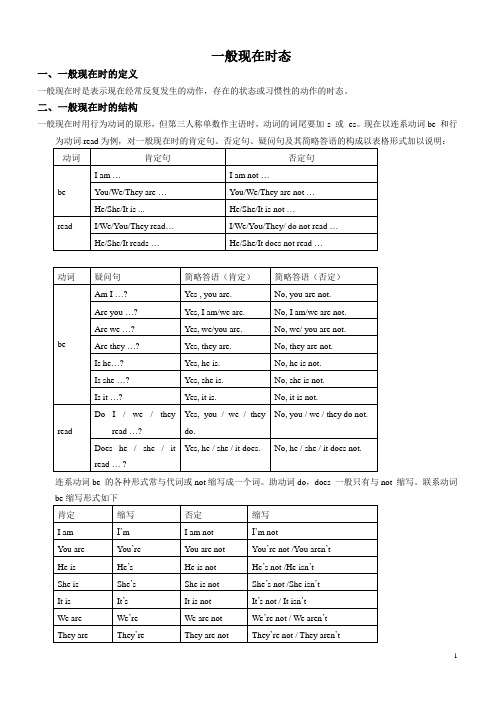
一般现在时态一、一般现在时的定义一般现在时是表示现在经常反复发生的动作,存在的状态或习惯性的动作的时态。
二、一般现在时的结构一般现在时用行为动词的原形,但第三人称单数作主语时,动词的词尾要加-s 或- es。
现在以连系动词be 和行为动词read为例,对一般现在时的肯定句、否定句、疑问句及其简略答语的构成以表格形式加以说明:连系动词be 的各种形式常与代词或not缩写成一个词。
助动词do,does 一般只有与not 缩写。
联系动词动词do not 的缩写形式为don’t,does not 的缩写形式为doesn’t。
二、动词加-s 或-es (动词第三人称单数)当主语是第三人称单数时,谓语动词需加-s 或-es1.一般在词尾加–s例:work—works leave --- leaves swim --- swims2.以字母s,x,ch,sh 或o结尾的词加-es例:pass--- passes fix ---fixes teach --- teaches do--- does3.以辅音字母加y结尾的词,先变y为i再加-es例:study --- studies carry --- carries fly --- flies cry --- cries三、一般现在时的用法1.表示经常或习惯性的动作。
常与often(经常), always(总是), sometimes(有时), every day(每天), on Sundays/Mondays 等表示频度的时间状语连用。
一般现在时的时间状语有:today, often, sometimes, always, usually, every day ( week, month, year,…) , this year, once a week ( month, year,…) 一周(月,年)一次例句:I get up at 6 o’clock every day.He often goes to school by bike.2.表示客观事实,普遍真理。
一般现在时与现在进行时练习题及答案
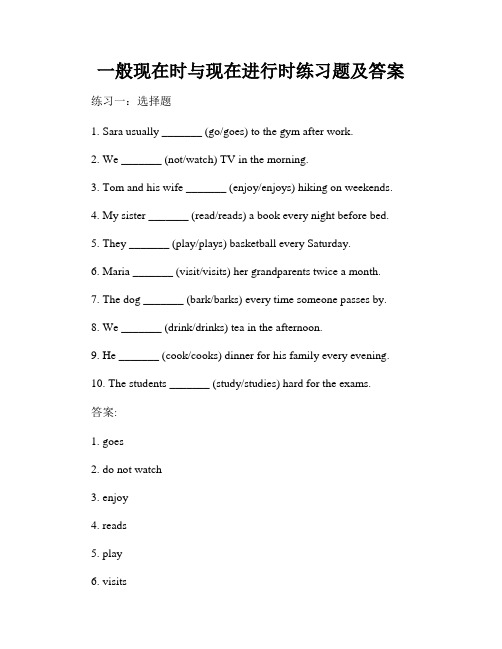
一般现在时与现在进行时练习题及答案练习一:选择题1. Sara usually _______ (go/goes) to the gym after work.2. We _______ (not/watch) TV in the morning.3. Tom and his wife _______ (enjoy/enjoys) hiking on weekends.4. My sister _______ (read/reads) a book every night before bed.5. They _______ (play/plays) basketball every Saturday.6. Maria _______ (visit/visits) her grandparents twice a month.7. The dog _______ (bark/barks) every time someone passes by.8. We _______ (drink/drinks) tea in the afternoon.9. He _______ (cook/cooks) dinner for his family every evening.10. The students _______ (study/studies) hard for the exams.答案:1. goes2. do not watch3. enjoy4. reads5. play6. visits7. barks8. drink9. cooks10. study练习二:用适当的动词形式填空1. I usually _______ (read) a book before bed.2. Look! The sun _______ (shine) brightly in the sky.3. My parents _______ (watch) TV every evening.4. They _______ (not go) to the park on Sundays.5. Sara _______ (drink) a cup of coffee every morning.6. The bus _______ (arrive) at 8 o'clock every day.7. We _______ (play) soccer on Saturdays.8. Jenny _______ (not eat) meat. She's a vegetarian.9. The children _______ (love) to play in the playground.10. Tom _______ (always be) late for school.答案:1. read2. is shining3. watch4. do not go5. drinks6. arrives7. play8. does not eat9. love10. is always。
小学一般现在时与现在进行时综合练习

小学一般现在时与现在进行时综合练习1.We often play in the playground.2.He gets up at six o'clock.3.Do you brush your teeth every morning?4.What does he usually do after school?5.Danny studies English。
Chinese and Maths.6.Mike nally goes to the park with his sister.7.At eight in the evening。
she watches TV with her parents.8.Does Mike read English every day?9.Mike sometimes goes to the park with his sister.10.What time does his mother do the housework?11.At eight in the evening。
she watches TV with her parents.12.Does Mike read English every day?13.How many lessons does your classmate have on Monday?14.Miss Guo is teaching us Chinese this term。
She is a very good teacher。
She often talks with us after class。
Many of us like to talk with her。
Currently。
she is talking with Lily.15.Han Meimei is the one who reads English frequently in the evening.16.Tom and Jim are playing football。
一般现在时和现在进行时练习题
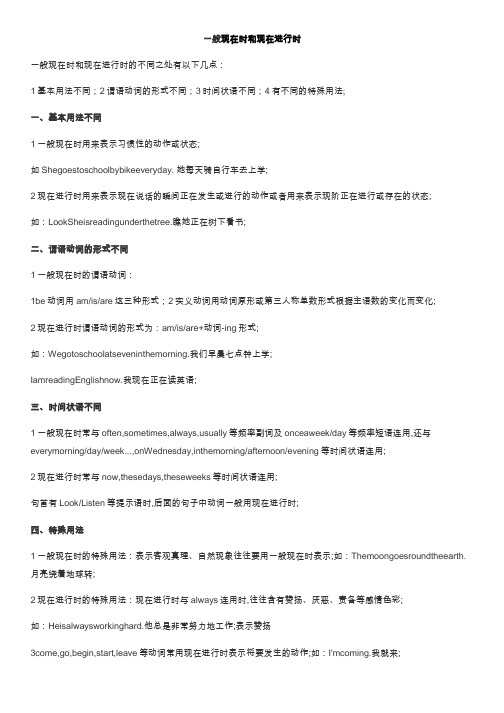
一般现在时和现在进行时一般现在时和现在进行时的不同之处有以下几点:1基本用法不同;2谓语动词的形式不同;3时间状语不同;4有不同的特殊用法;一、基本用法不同1一般现在时用来表示习惯性的动作或状态;如Shegoestoschoolbybikeeveryday. 她每天骑自行车去上学;2现在进行时用来表示现在说话的瞬间正在发生或进行的动作或者用来表示现阶正在进行或存在的状态;如:LookSheisreadingunderthetree.瞧她正在树下看书;二、谓语动词的形式不同1一般现在时的谓语动词:1be动词用am/is/are这三种形式;2实义动词用动词原形或第三人称单数形式根据主语数的变化而变化;2现在进行时谓语动词的形式为:am/is/are+动词-ing形式;如:Wegotoschoolatseveninthemorning.我们早晨七点钟上学;IamreadingEnglishnow.我现在正在读英语;三、时间状语不同1一般现在时常与often,sometimes,always,usually等频率副词及onceaweek/day等频率短语连用,还与everymorning/day/week...,onWednesday,inthemorning/afternoon/evening等时间状语连用;2现在进行时常与now,thesedays,theseweeks等时间状语连用;句首有Look/Listen等提示语时,后面的句子中动词一般用现在进行时;四、特殊用法1一般现在时的特殊用法:表示客观真理、自然现象往往要用一般现在时表示;如:Themoongoesroundtheearth.月亮绕着地球转;2现在进行时的特殊用法:现在进行时与always连用时,往往含有赞扬、厌恶、责备等感情色彩;如:Heisalwaysworkinghard.他总是非常努力地工作;表示赞扬3come,go,begin,start,leave等动词常用现在进行时表示将要发生的动作;如:I'mcoming.我就来;一、写出下列动词的现在分词形式-ing;sing__________ play__________ study__________have__________write__________take__________sit__________shop__________swim__________4. lie__________二、写出下列动词的第三人称单数形式;read__________ clean__________write__________wash__________ guess__________ watch__________3. go__________do___________photo__________ have__________fly__________cry__________ play__________三、填空;1. My father always __________come back from work very late.2. The teacher is busy. He __________ sleep six hours a day.3. Listen Joan __________sing in the classroom. She often __________ sing there.4. __________ your brother __________know Japanese5. Where __________ you __________ have lunch every day6. The girl __________like wearing a skirt. Look She __________wear a red skirt today. _________read English every day.he_________like_________jump9. Let's____________and play football . go10. He_____________ like swimming . not按要求改写下列句子:usually play football on Friday afternoon.否定句:一般疑问句:划线提问:Yang usually washes some clothes on Saturday.否定句:一般疑问句:划线提问:3. My mother is cooking some nice food now.否定句:一般疑问句:划线提问:一、选择题练习1. Who _____ over there nowA. singingB. are singC. is singingD. sing2. It’s eight o’clock. The students _____ an English class.A. haveB. havingC. is havingD. are having3. Listen The baby _____ in the next room.A. cryingB. criedC. is cryingD. cries4. Look The twins _____ new sweaters.A. are wearingB. wearingC. are wearD. is wearing5. Don’t talk here. Grandparents _____.A. is sleepingB. are sleepingC. sleepingD. sleep6. Tom is a worker. He _____ in a factory. His sisters _____ in a hospital.A. work/ workB. works/ workC. work/ works7. Who _____ English best in your classA. speakB. speaksC. speaking8. Mrs Read _____ the windows every day.A. is cleaningB. cleanC. cleans9. We _____ music and often _____ to music.A. like/ listenB. likes/ listensC. like/ are listening10. She _____ up at six in the morning. A. get B. gets C. getting11. On Sunday he sometimes _____ his clothes and sometimes _____ some shopping.A. wash/ doB. is washing/ is doingC. washes/ does12. The twins usually _____ milk and bread for breakfast, but Jim _____ some coffee for it.A. have/ haveB. have/ hasC. has/ have五、根据中文意思完成句子1、学生们在干什么有一些在打电话,另一些躺在沙滩上;_____ _____ the students _____ Some _____ _____ on the phone, _____ _____ _____ on the beach.2、“格林先生在看电视吗” “不, 他在打扫房间;”“_____ Mr Green _____ TV” “_____, He _____ _____ the house.”3、魏芳不是在读书,她在写信;Wei Fang _____ _____ a book. She _____ _____ a letter.4、今天天气怎么样_____ is the weather today 或_____ is the weather _____ today5、我正在通过收音机学 learn 英语;I _____ _____ English on the radio.6、这个老人每天早上六点钟起床;The old man _____ _____ at six o’clock in the morning every day.7、你从哪里来 Where _____ you from 或Where _____ you _____ from我从美国来; I _____ from America. 或I _____ from America.。
小学重要知识点总结现在进行时和一般现在时的学习与应用

小学重要知识点总结现在进行时和一般现在时的学习与应用现在进行时和一般现在时是小学英语中的两个重要的时态。
本文将对现在进行时和一般现在时的学习与应用进行总结。
一、现在进行时(Present Continuous Tense)现在进行时表示现在正在进行的动作或状态。
它的主要结构是“助动词be(am/is/are)+现在分词”,其中助动词的形式要根据主语的人称和数的不同变化。
1. 现在进行时的构成:肯定句:主语 + am/is/are + 现在分词否定句:主语 + am/is/are + not + 现在分词疑问句:Am/Is/Are + 主语 + 现在分词?2. 现在进行时的用法:(1)表示目前正在进行的动作或状态:例句:He is playing basketball now.(他正在打篮球。
)(2)表示现阶段正在发生的变化:例句:The weather is getting colder.(天气正在变冷。
)(3)表示安排好的、即将发生的动作:例句:I am meeting my friend tomorrow.(我明天将要见我的朋友。
)3. 现在进行时的时间状语:现在进行时通常与时间状语连用,常见的有:now(现在)、at the moment(此刻)、today(今天)、this week(本周)、at present(目前)等。
二、一般现在时(Simple Present Tense)一般现在时用来描述客观事实、经常性的动作或习惯,以及表达真理等。
一般现在时的动词在第三人称单数时要加上“-s”。
1. 一般现在时的构成:肯定句:主语 + 动词原形(第三人称单数要加-s)否定句:主语 + do/does + not + 动词原形疑问句:Do/Does + 主语 + 动词原形?2. 一般现在时的用法:(1)表达客观事实或普遍真理:例句:The earth revolves around the sun.(地球绕着太阳转。
- 1、下载文档前请自行甄别文档内容的完整性,平台不提供额外的编辑、内容补充、找答案等附加服务。
- 2、"仅部分预览"的文档,不可在线预览部分如存在完整性等问题,可反馈申请退款(可完整预览的文档不适用该条件!)。
- 3、如文档侵犯您的权益,请联系客服反馈,我们会尽快为您处理(人工客服工作时间:9:00-18:30)。
一般现在时态一、一般现在时的定义一般现在时是表示现在经常反复发生的动作,存在的状态或习惯性的动作的时态。
二、一般现在时的结构一般现在时用行为动词的原形,但第三人称单数作主语时,动词的词尾要加-s 或 - es。
现在以连系动词be 和行为动词 read 为例,对一般现在时的肯定句、否定句、疑问句及其简略答语的构成以表格形式加以说明:动词肯定句否定句I am ⋯I am not ⋯be You/We/They are ⋯You/We/They are not ⋯He/She/It is ...He/She/It is not ⋯read I/We/You/They read ⋯I/We/You/They/ do not read ⋯He/She/It reads ⋯He/She/It does not read ⋯动词be read 疑问句Am I ⋯ ?Are you ⋯?Are we ⋯ ?Are they ⋯ ?Is he⋯?Is she ⋯?Is it ⋯?Do I / we / they read⋯ ?简略答语(肯定)Yes , you are.Yes, I am/we are.Yes, we/you are.Yes, they are.Yes, he is.Yes, she is.Yes, it is.Yes, you / we / they do.简略答语(否定)No, you are not.No, I am/we are not.No, we/ you are not.No, they are not.No, he is not.No, she is not.No, it is not.No, you / we / they do not. Does he / she / itread ⋯ ?Yes, he / she / it does.No, he / she / it does not.连系动词be 的各种形式常与代词或not 缩写成一个词。
助动词do,does 一般只有与not 缩写。
联系动词be 缩写形式如下肯定缩写否定I am I ’m I am not You are You’re You are not He is He’s He is not She is She’s She is not It is It ’s It is notWe are We’re We are not They are They’re They are not 缩写I ’m notYou’re not /You aren’t He ’s not /He isn ’t She’s not /She isn’tIt ’s not / It isn ’tWe’re not / We aren’t They ’re not / They aren’t动词 do not 的缩写形式为don’t, does not 的缩写形式为doesn’t。
二、动词加 -s 或 -es (动词第三人称单数)当主语是第三人称单数时,谓语动词需加-s 或 -es1.一般在词尾加–s例: work — works leave --- leaves swim --- swims2.以字母 s, x,ch, sh 或 o 结尾的词加 -es例: pass--- passes fix ---fixes teach --- teaches do--- does3.以辅音字母加y 结尾的词,先变y 为 i 再加 -es例: study --- studies carry --- carries fly --- flies cry --- cries三、一般现在时的用法1.表示经常或习惯性的动作。
常与often(经常) , always(总是) , sometimes(有时) , every day(每天) , on Sundays/Mondays 等表示频度的时间状语连用。
一般现在时的时间状语有:today, often, sometimes, always, usually, every day ( week, month, year, ⋯ ) , this year, once a week ( month, year,⋯ ) 一周(月,年)一次例句: I get up at 6 o’clock every day.He often goes to school by bike.2.表示客观事实,普遍真理。
例句: Two and two are four. 二加二等于四。
The earth moves around the sun.地球绕着太阳转。
一般现在时态专项练习一、写出下列动词的第三人称单数形式post like ride studyeat visit have watchstop pass give flyjump rise write teachgo read swim do二、单项选择( )1._____ you have a book ?A Do B. Are C. Is D. Have( )2.Does Li Lei like to watch TV?______________.A. Yes, he like.B. No, he doesn’t.C. Yes, he’d like.D. No, he likes.( )3.She doesn’t______ her homework in the afternoon.A. doingB. to doC. doesD. do( )4.How ____ Mr. Smith ______ to England?A. do, goB. is , goC. does, goD. does , goes( )5. _____ she ______ home at six every day?A. Is , leaveB. Does , leaveC. Is , leavesD. Does , left 三、用下列动词的适当形式填空1.I ______ ( get ) up at 6 o ’clock every day.2.My father ______ (have) a lovely dog.3.He ______ (go ) to school on foot.4.She ______ (do ) not like watching TV .5.They ______ (play) football every Sunday afternoon.四、按要求完成下列各题1.Tomorrow is Saturday.( 变成一般疑问句)_________ ________ Saturday ?2.Does he play basketball every weekend? ( 肯定回答 )Yes, _____________.3.She looks like her sister.( 变一般疑问句 )_____ she ______ like her sister ?4.Peter and Sam look the same.(一般疑问句 )______ they _____ the same ?5.Do they always go to the movie ( 电影院 ) on Sundays ? (否定回答 )No, ______________.五、英汉互译1.Tom 经常放学后( after school)踢足球。
__________________________________2.我喜欢唱歌。
__________________________________3.He often goes to school on foot.__________________________________4.Children like to play this game.__________________________________5.今天是星期日。
__________________________________能力测试卷(一般现在时)一、写出下列动词的第三人称单数形式go stop write buyhave do fly giveswim ride play watchstudy cry read workrise go come carry二、用动词的适当形式填空1.He _______ (go) to school on foot.2.She _______ not like watching TV. (do)3.My father _______ (have) a lovely dog.4.I often ______ ( get ) up at six every morning.5.My mother _______ ( work) in a school.三、英汉互译1.他经常在周六的时候读英语。
_____________________________2.Peter 每天都帮助妈妈做家务。
______________________________3.Tom always plays football after school.______________________________4.I get up at six o’clock every day._______________________________5.The coat fits (适合 ) me very well._______________________________现在进行时态一、现在进行时的定义现在进行时是表示在现在某一时刻或某段时间正在进行的动作的时态。
二、现在进行时的构成现在进行时由“系动词(am,is ,are) + 现在分词(动词加-ing 形式)”构成。
现在以动词work 为例,对现在进行时的肯定句、否定句、疑问句及简略答语列表说明:肯定句否定句I am working.I am not working.You are working.You are not working.He/She/It is working.He/She/It is not working.We/You/They are working.We/You/They are not working.疑问句简略答语Am I working?Yes, you are.No, you are not.Are we working?Yes, we/ you are.Are you working?Is he/she it working ? Are they working?No, we/ you aren ’t. Yes, I am.No, I am not. Yes, we are.No, we are not. Yes, he/she/it is. No, he/she/it is not. Yes, they are. No, they are not.三、现在分词的构成1.一般在动词原形末尾加 -ing 。
